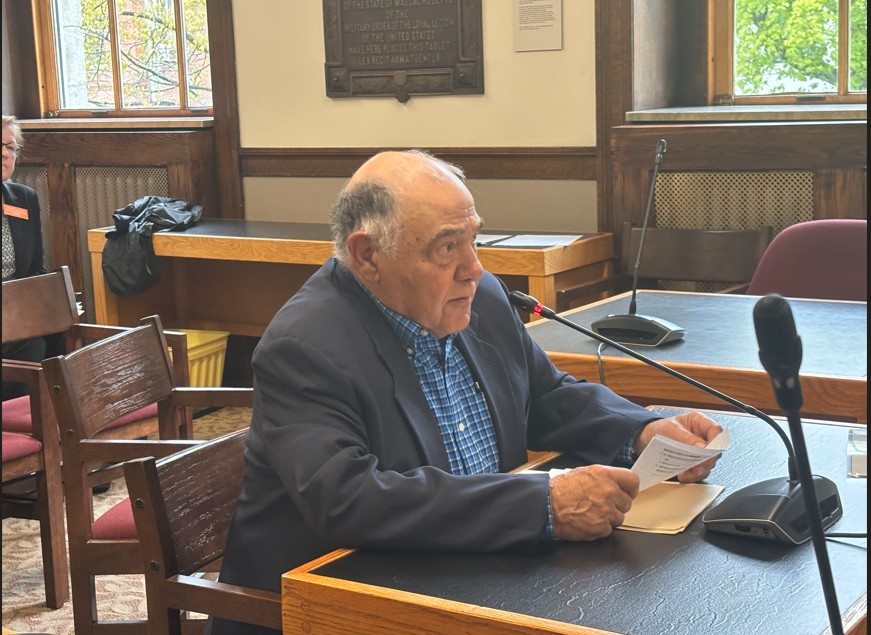PAULA TRACY, InDepthNH.org
CONCORD – Called an “existential threat” to the state’s $1.4 billion annual timber and forest products industry by some, state Senators were also warned that HB 123 was unfair and would tax lands enrolled in carbon credit programs at least twice.
But supporters of HB 123 said it would close a tax loophole created by this new way to make money off timberland instead of cutting and allow municipalities, which rely on timber tax revenue, a continued stream of revenue.
The packed hearing room was equally divided on the matter with officials from the state Department of Revenue Administration saying the bill that passed the House would be unworkable.
But one thing that most speakers agreed on was that it would not hurt to study the issue rather than take action this year.
Sen. Howard Pearl, R-Loudon, co-sponsor of the bill and a member of the Senate Energy and Natural Resources Committee, said he would offer an amendment next week when the committee votes to a two-year study committee and moratorium between July 1 and whenever the committee completes its work within two years. It provides that no owner of standing timber shall enter into or take action to enroll in carbon credit offset programs.
Some, like Jasen Stock, executive director of the NH Timberland Owners Association which opposes HB 123, said they would support the study but not the moratorium.
Another amendment to HB 123 https://gc.nh.gov/bill_status/billinfo.aspx?id=106&inflect=2
that was discussed but not voted on, was offered by state Sen. David Rochefort, R-Littleton, which would fix the issues DRA said were unworkable, said Charlie Levesque, who worked on the measure with Rochefort, DRA and others.
The public hearing on the bill brought many from the state’s North Country who are impacted by a change in the way property owners can now earn income.
They can now enroll their tracts of land in markets that allow them to be paid for standing timber which captures carbon.
But municipalities, which rely on the 10 percent timber tax, which is reduced by carbon sequestration programs, said the bill is needed to help them and their taxpayers and to even the playing field.
Scott Rineer of Errol works for Wagner Forest Management. He said he strongly opposed the bill as written but would support a two-year study.
He said the bill is “very unclear,” and from his experience as a selectman it would “put burdens on assessing services.” He said he did not support the moratorium.
Some said the bill was a singular reaction to the purchase of the 146,000-acre Connecticut Lakes Headwaters tract by Aurora Sustainable Lands which is a carbon-first company. It bought the land as part of a merger with other industrial tracts in 2022 but was enrolled in the California carbon compliance market for 100 years in 2013.
Since that time, the amount of cutting on that land has gone from about 40,000 cords a year to 20,000 cords and it has been a loss of timber tax revenue for the towns of Pittsburg, Stewartstown and Clarksville. While the company has made payments in lieu of taxes to offset the losses, some are worried that there is no law to allow for taxation if the timber is not cut.
Thomas Hahn, whose firm manages 50,000 acres, said if one looks at the state list of those who have enrolled in carbon credit programs, “it is not a bunch of out of state companies” but mostly people who have been managing timber here for years.
Some markets, he said, are for terms of only 10 or 20 years and most of them will have no effect on municipal revenue tax.
“I am in support of a study commission,” he said.
State Rep. Dan McGuire, R-Epsom, spoke on behalf of the Granite State Taxpayers Association in support of the bill.
He said taxes change behavior and if no action is taken it would discourage productivity in New Hampshire and encourage property owners to enroll in carbon credit.
“If we tax one thing and not the other…this bill balances that scale.”
Members of the Coos County Commission, including Robert Theberge and Raymond Gorman spoke in strong support of the bill noting that the emergence of this carbon market and the reduction in revenue for unincorporated places has dramatically gone down in the past two and half years.
They noted it is clear that carbon sequestration will impact wildlife, roads used by OHRV and logging.
“We just want to make sure the towns are protected to get what they are getting,” Gorman said. “We just don’t want to lose what we have.”
Mark Brady, Coos County administrator, said, “we have always been agnostic about carbon credits and carbon sequestration. The issue is taxation,” and that without closing “the loophole you are incentivizing” owners to register their lands for carbon sequestration.
“You are a property owner, do what you want with your property within the law but pay your fair share and don’t live off the taxpayers of Coos County,” Brady said.
Executive Councilor Joseph Kenney, R-Wakefield, spoke in favor of the bill. He called it an “existential threat” to the timber industry and a way of life.
The creation of a registry was a tremendous first step, Kenney said, as the public can now know which properties are in carbon programs.
Nine properties are on it now with about 186,000 acres tied up in carbon credit sequestration.
Some have not sold credits yet.
Jennifer Ramsay, tax policy counsel for the Department of Revenue, said as written they would not be able to implement it, and there are a number of unanswered questions like when is a taxable event to advise local assessors including “net value.”
Stock of NHTOA said the bottom line is that the bill as written is unenforceable.





